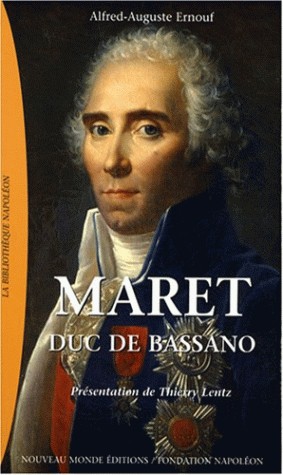Alfred-Auguste Ernouf: Maret, duc de Bassano (Maret Duke of Bassano)
 Criticized by Talleyrand (“I know only oneman more stupid than Maret, and that’s the Duke of Bassano”) and portrayed in an unflattering light by Thiers in his Histoire du Consulat et de l’Empire (History of the Consulate and the Empire), Hugues-Bernard Maret (1763-1839) was nevertheless one of the essential pivots of the Napoleonic regime for nearly fifteen years.
Criticized by Talleyrand (“I know only oneman more stupid than Maret, and that’s the Duke of Bassano”) and portrayed in an unflattering light by Thiers in his Histoire du Consulat et de l’Empire (History of the Consulate and the Empire), Hugues-Bernard Maret (1763-1839) was nevertheless one of the essential pivots of the Napoleonic regime for nearly fifteen years.
Son of a doctor, lawyer, diplomat and journalist, in 1799 he was appointed secretary general of the consuls and began a meteoric career path. Secretary of State, he was the hub of the Napoleonic government and reaped the rewards of his ministerial rank with gifts, decorations and titles: Count of the Empire and Duke of Bassano in 1809. Indeed his diplomatic past was enough justification for the Emperor to use him in major negotiations (Pressburg, Tilsit, Bayonne) before making him in charge, for a time, of the Ministry of Foreign Affairs. His career continued after the fall of the Empire, first among the ranks of the most assertive Bonapartists, and then in the circles of power of the July Monarchy. Louis Philippe even tried unsuccessfully to make him his Chairman. A hard worker and a man of authority, Maret remains for posterity one of Napoleon’s most faithful servants and a little-known figure in the epic.
French historian and writer, Alfred Augustus Ernouf (1817-1889) is the author of numerous books and biographies such as Denis Papin, his life and his work and Ludwig van Beethoven.
Paris: Editions de la Fondation Napoléon – Nouveau Monde Éditions, 2008, Series Biographies, 608 pages.
To order visit the website of Nouveau Monde Éditions.
